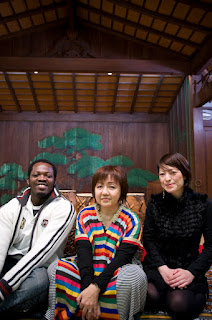Loving Younger Men by Yuri Kageyama.
Winchester Nii Tete odono (talking drum) and Keiji Kubo didgeridoo.
"Talking Taiko" at the Kuraki Noh Theater, Yokohama, Japan, Dec. 6, 2008
Only the bodies of young men aroused her;
the pure innocence in their wide dark eyes,
the wild still animal strength in their muscles,
the smoothness of their skin, so shiny, stretched
out over their boy-like shoulders, flat stomachs,
abdominals rippling gently, their thick thighs
that could thrust forever into the night, their
soft moist lips, where their tonges, so delicious,
dwelt, which darted against, into her vagina,
making her moan with joy, forgetting everything,
which felt so strong against her own tongue at one
moment, yet another, seemed to melt like caramel
in the back of her throat,
their dry fingers, that touched her in the most
unexpected and expecting spots,
their penises, half-covered by their black curls,
seemed smaller, less developed, less threatening,
yet as their shoulders strangely widened
when they held her, their penises filled her,
pointed against her deepest uterine insides,
hurting her with a pleasurable pain, as though
she could sense with her hand, their movements
from outside her belly. Her father beat her as a girl.
She ran from him, crying, please don't hit me! please
don't hit me! No, rather she stood defiant, silent,
silent tears drunk down her chest, till he, in anger
or fear,
slapped her again and again, once so hard she was
swung across the room, once on her left ear so
that she could not hear for three weeks. She
frequented bars, searching for young men who desired
her. She sat alone drinking. She preferred
the pretty effeminate types _ perfectly featured,
a Michelangelo creation, island faces with coral eyes,
faces of unknown tribal child-princes. To escape
her family, she eloped at sixteen, with an alchoholic.
who tortured her every night, binding her with ropes,
sticking his penis into her mouth until she choked,
hitting her face into bruises, kicking her in
the stomach, aborting her child, his child.
The young boys' heads, she would hold, after orgasm,
rocking them in her arms. She would kiss the side of their
tanned necks, breathe in the ocean scent of their hair,
lick their ear lobes and inside their ears. When they
fell asleep, sprawled like a puppy upon her sheets,
their mouths open, she would lie awake watching,
watching, watching, admiring their bodies, how so
aesthetically formed, balanced, textured. What
she enjoyed the most was their fondling her breasts,
suckling, massaging the flesh, flicking the tongue
against the nipple, biting, sucking till her nipples
were red-hot for days. She could come just by this,
without penetration.
When she is alone, she cries. In the dark, she reaches
upwards, into the air, grabbing nothing.











